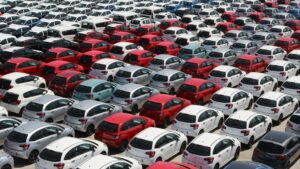Union Minister to Introduce Car Powered by 100% Ethanol on August 29th

On Wednesday, Nitin Gadkari, the Minister of Road Transport and Highways, announced that he will introduce a Toyota Innova car model running entirely on 100% ethanol. The unveiling of this innovative variant is scheduled for August 29th.
The Union minister, known for advocating alternative fuels and eco-friendly vehicles, had previously launched a hydrogen-powered car, the Toyota Mirai EV, last year.
Speaking at the Mint Sustainability Summit, Gadkari announced his plan to unveil a 100% ethanol-powered version of the popular Toyota Innova car on August 29th. This vehicle will hold the distinction of being the world’s first BS-VI (Stage-II) electrified flex-fuel vehicle.
Gadkari’s interest in biofuels dates back to 2004 when India experienced a surge in petrol prices. He even visited Brazil to explore biofuel possibilities. He emphasized the transformative potential of biofuels, asserting that they can significantly reduce India’s reliance on costly petroleum imports, which currently amount to ₹16 lakh crore and represent a substantial economic burden.
Highlighting the pressing issue of pollution in India, Gadkari stressed the need for sustainable measures. He acknowledged that while India has taken various sustainability initiatives, there is a necessity for more comprehensive actions. Gadkari emphasized the importance of tackling air and water pollution and improving river water quality, underlining the need to protect the country’s ecology and environment.
Furthermore, he noted that a collection of road projects with an estimated value of ₹65,000 crore is on track for completion by the end of the year. This portfolio encompasses significant undertakings, including the construction of the Dwarka Expressway.
Gadkari also drew attention to the detrimental effects of chemical fertilizers and pesticides, emphasizing their role in the emergence of cancer-like diseases. He expressed his belief that embracing organic farming practices could yield substantial economic benefits and contribute to the journey towards sustainability.
“Promoting the transformation of waste into valuable resources through education is imperative,” he remarked. Gadkari also expressed optimism that the development of additional highways would help reduce the current logistic costs, aiming to bring them down from the current range of 14 to 16 percent to a more favorable nine percent.




